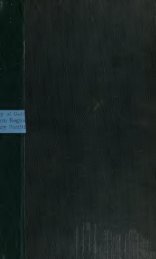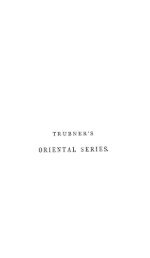Untitled
Untitled
Untitled
You also want an ePaper? Increase the reach of your titles
YUMPU automatically turns print PDFs into web optimized ePapers that Google loves.
.<br />
.<br />
.<br />
' ii4'<br />
NOTES<br />
ON THE SECOND DISCOURSE<br />
i<br />
4<br />
Riidak, & district situated n/iar Samarqand. His full name was Abu<br />
'Abdu'jlah Ja'far ibn Muhammad; he was "the first to produce good<br />
poetry in Persian," and he died in 329/940-1. See the late Dr Hermann*<br />
1<br />
lathe's monumental paper Rtidagi, der Salnamdendifhter . The vocalization<br />
Rawdhaki also occurs, with the addition of the names of the<br />
poet's grandfather (Hakim)*, great-grandfather ('Abdu'r-Rahman), and<br />
great-great-grandfather (Adam). See rhy Hand-list of Muhammadan<br />
Manuscripts (Cambridge, 1900), No. 701, pp. 125-6.<br />
Abu'l-'Abbas as-Ribanjani's<br />
fulr name was Fadl ibn 'Abbas.<br />
See 'Awfi's Lubdb, vol. ii, p. 9. Ribanjan (the correct reading is due to<br />
the late Professor de is Goeje) a city near Sughd and Samarqand, given<br />
It is also mentioned in<br />
by Yaqiit in the corrupt form " Rabaykhan."<br />
the Ansdb of as-Sam'ani (Gibb Series, Vol. xx, ,ff. 23 b ,.and 248 b ) as<br />
Atbinjan and Rabinjan. Mirza Muhammad has furnished me with a<br />
fresh reference to this Abu'l-'Abbas in the Thimdrrfl-Qulub (Cairo ed.,<br />
p. 147) of ath-irha'alibi, where some Persian verses (a good deal<br />
corrupted in the printed text) from an unlucky qasida which he com-<br />
posed on the occasion of a festival in the thirty-first and last year of the<br />
reign of his patron Nasr ibn Ahmad the Samanid (A.H. 331 = A.D. 942-3)<br />
are cited.<br />
Abu'l-Mathal of Bukhara is mentioned in the Lubdb (ii, 26)<br />
and in Asadi's Glossary (ed. P. Horn, p. 28). The vocalization "Mathal"<br />
is proved by a verse of Mintichihri's in which mention is made of ten old<br />
Persian poets, all of whom are identified by Mirza Muhammad, who<br />
cites the verse (pp. 127-9 f the Persian notes). Of these the most<br />
interesting is Shahid of Balkh, who resembles 'Umar Khayyam in this,<br />
that his real fame as a philosopher has amongst his countrymen been<br />
eclipsed by his fame as a poet, though he was much more notable in the<br />
former than in the latter capacity. He is mentioned in the Fihrist,<br />
p. 299, as a doughty antagonist of Abii Bakr Muhammad ibn Zakariyya ar-<br />
EJazi (the great physician), who wrote a treatise in refutation of some of his<br />
opinions. Yaqut also mentions him in his article on Jahudhdnak near<br />
Balkh, the village in which he was born, while Tha'alibi reckons him as<br />
one of the four greatest men produced by that ancient city. The correct<br />
reading in this last case is given in the Paris MS.' of the Yatimatu'd-<br />
*'Dahr; in the printed text it appears as "Sahl ibn'u'l- Hasan" instead of<br />
"Shahidu ibnu'l-Husayn." That he predeceased Riidaki, who died in<br />
329/940-1, is proved by a verse in which that poet laments tys death.<br />
He is casually mentioned, as Mirza, Muhammad points ouf. to me, in<br />
two passages in Yaqiit's " Dictionary of Learned Men"<br />
( (Gibb Series, vi,<br />
i, pp. 143 and 149), and an article on him was included in the lost<br />
fourth volume of this work. 'Awfi also relates* a short and rather pointless<br />
story about him in the Jawdmfrfl-Hikdydt (Brit. MUS. MS.<br />
Or. 2676, f. 235 b ).<br />
Abu Ishaq-i-Juybari's personal name, according to tiie^Lubdb<br />
(iif 1 1) and Asadi's Glossary (p. 17), was Ibrahim, and his father's name<br />
was Muhammad. The Juybar from which he derived his nisba was<br />
apparently situated near Bukhara.<br />
1<br />
Gottinger Nachrichten, 1873, pp. 663-742.








![La religione di Zarathustra nella storia religiosa dell' Iran [microform]..](https://img.yumpu.com/15970820/1/151x260/la-religione-di-zarathustra-nella-storia-religiosa-dell-iran-microform.jpg?quality=85)


